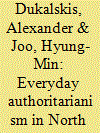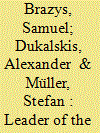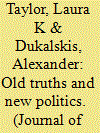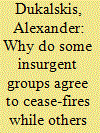|
|
|
Sort Order |
|
|
|
Items / Page
|
|
|
|
|
|
|
| Srl | Item |
| 1 |
ID:
177862


|
|
|
|
|
| Summary/Abstract |
This article examines the political consequences of widespread social changes in North Korea to illuminate how, if at all, shifts in everyday life influence the power of an autocratic government. Our study is based on 23 interviews with North Korean defectors in 2017 and supplemented by interviews conducted in previous years. The main finding is that social practices associated with marketisation, flows of information, and increased corruption have not yet provided the foundation for collective challenges to the regime. It is, however, also clear that official norms, rules, and institutions have been significantly weakened to adapt to new social realities.
|
|
|
|
|
|
|
|
|
|
|
|
|
|
|
|
| 2 |
ID:
108034


|
|
|
|
|
| Publication |
2011.
|
| Summary/Abstract |
While there have been recent advances in theories of transitional justice, there remains a lack of theory about how truth commissions and human rights trials interact with each other to facilitate or constrain efforts at transitional justice. This is an important deficiency to remedy because numerous countries long ago leapt ahead of transitional justice theory by sequencing trials and truth commissions, while the International Criminal Court (ICC) will have to manage relationships with truth commissions as its work accelerates. The aim of this article is to use current literatures on transitional justice and political transitions to build a theory of how trials and truth commissions interact with each other. This will be done in three steps. First, the article will elaborate the goals and critiques of trials and truth commissions in order to provide a foundation for how they might interact. Second, the article will consider these institutions in sequence to understand how they interact when trials operate first, truth commissions first, or when they operate simultaneously. Third, the article will consider these sequences in context to understand how legacies of violence and its termination may affect their relationship. This effort is meant to clarify the theoretical issues at stake in the sequencing of these two important institutions, stimulate debate, and inform institutional design.
|
|
|
|
|
|
|
|
|
|
|
|
|
|
|
|
| 3 |
ID:
192188


|
|
|
|
|
| Summary/Abstract |
This research report measures changes in China's public diplomacy after a May 2021 collective study session of the Chinese Communist Party Politburo. The session examined the country's global communications strategy and fuelled speculation about what might change in China's external communications, particularly with regard to its “wolf warrior” diplomats. Combining hand-coding and quantitative text analysis, we develop and validate a measure of “wolf warrior diplomacy” rhetoric and apply it to over 200,000 tweets from nearly 200 institutional, media and diplomatic Twitter accounts. Using a difference-in-difference research design, we evaluate if the session led to a noticeable change in the tweets of diplomats based in OECD countries. After the announcement, PRC diplomats in the OECD moderated their tweets in comparison to non-OECD diplomats, but we do not detect a major re-orientation of PRC communication strategies. These findings have relevance for scholars of Chinese foreign policy, nationalism and public diplomacy.
|
|
|
|
|
|
|
|
|
|
|
|
|
|
|
|
| 4 |
ID:
153687


|
|
|
|
|
| Summary/Abstract |
Myanmar has experienced significant political liberalization since 2011. Alongside the political reforms, a peace process to end the country’s several insurgencies has continued. This article analyzes this “double transition” by asking how political liberalization has shaped the peace process. It elaborates six ways that liberalization has influenced the quest for peace.
|
|
|
|
|
|
|
|
|
|
|
|
|
|
|
|
| 5 |
ID:
145307


|
|
|
|
|
| Summary/Abstract |
An unofficial or ‘shadow’ economy like that in contemporary North Korea generates countervailing pressures for a socialist regime. It can buttress the regime by facilitating the cynical use of anti-market laws, alleviating shortages, helping the official economy to function, and creating vested interests in the status quo. On the other hand, the shadow economy can corrode the regime’s power by diminishing its control over society, encouraging scepticism about collective ideologies, and providing networks and material that can be used for opposition to the state. This article analyses these tensions in the DPRK, by drawing on 35 semi-structured interviews with North Korean defectors.
|
|
|
|
|
|
|
|
|
|
|
|
|
|
|
|
| 6 |
ID:
159179


|
|
|
|
|
| Summary/Abstract |
This article aims to understand the policies of three major Northeast Asian states toward the Rome Statute and the International Criminal Court (ICC) that it established. Using a unique measurement tool, it traces the interactions of South Korea, Japan, and China with the Court since negotiations on its formation in the late 1990s. Included in this analysis is a focus on how Northeast Asian states have responded to recent efforts to bring North Korea into the Court's orbit for that country's military actions in 2010 and its human rights record over several decades. Data is based on publicly available documents as well as interviews with diplomats, legislators, legal experts, and activists in Japan, South Korea, and China conducted in 2015.
|
|
|
|
|
|
|
|
|
|
|
|
|
|
|
|
| 7 |
ID:
117593


|
|
|
|
|
| Publication |
2012.
|
| Summary/Abstract |
This article analyzes the relationship between truth and politics by asking whether the 'publicness' of a truth commission - defined by whether it has public hearings, releases a public report, and names perpetrators - contributes to democratization. The article reviews scholarship relevant to the potential democratizing effects of truth commissions and derives mechanisms that help explain this relationship. Work from the transitional justice field as well as democratization and political transition more generally is considered. Using a newly-constructed Truth Commission Publicness Dataset (TCPD), the analysis finds that even after statistically controlling for initial levels of democracy, democratic trends in the years prior to a commission, level of wealth, amnesties and/or trials, the influence of the South African Truth and Reconciliation Commission, and different cutoff points for measuring democratization across a number of models, more publicness predicts higher levels of democracy years after the commission has finished its work. The more public a truth commission is, the more it will contribute to democratization. The finding that more public truth commissions are associated with higher levels of democratization indicates particular strategies that policymakers, donors, and civil society activists may take to improve prospects for democracy in a country planning a truth commission in the wake of violence and/or government abuse.
|
|
|
|
|
|
|
|
|
|
|
|
|
|
|
|
| 8 |
ID:
140789


|
|
|
|
|
| Summary/Abstract |
This article uses Burma/Myanmar from 1948 to 2011 as a within-case context to explore why some armed insurgent groups agree to cease-fires while others do not. Analyzing 33 armed groups it finds that longer-lived groups were less likely to agree to cease-fires with the military government between 1989 and 2011. The article uses this within-case variation to understand what characteristics would make an insurgent group more or less likely to agree to a cease-fire. The article identifies four armed groups for more in-depth qualitative analysis to understand the roles of the administration of territory, ideology, and legacies of distrust with the state as drivers of the decision to agree to or reject a cease-fire.
|
|
|
|
|
|
|
|
|
|
|
|
|
|
|
|
|
|
|
|
|